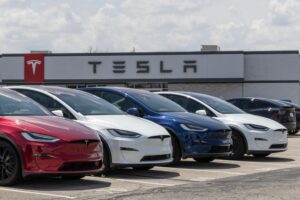
Elon Musk has warned that Tesla faces “a few rough quarters” ahead as the electric carmaker reported its steepest revenue decline in over a decade, missing Wall Street forecasts and rattling investors already uneasy about demand, tariffs, and political uncertainty.
Shares in Tesla fell 4 per cent in after-hours trading after the company revealed that second-quarter revenue dropped 12 per cent year-on-year to $22.5 billion, falling short of the $22.7 billion analysts had expected. Net income declined 16 per cent to $1.2 billion during the same period.
Speaking on an earnings call, Musk described the current landscape as a “weird transition period” shaped by the end of US EV tax incentives, Trump’s shifting trade policies, and growing regulatory uncertainty around autonomous vehicles.
“Does that mean we could have a few rough quarters? Yeah, we probably could,” Musk told analysts. “It’s not guaranteed, but plausible.”
Despite a 50 per cent rally since April, Tesla’s share price remains down 12 per cent year-to-date, weighed down by slowing electric vehicle demand, intensified competition in China, and Musk’s high-profile exit from Trump’s administration in May.
Some shareholders had hoped Musk would refocus his attention on Tesla after tensions with Trump and rising political noise. However, those hopes were dashed when the billionaire announced he would launch a new political movement called the America Party, further entrenching his role in partisan politics.
In its Q2 report, Tesla said it delivered 384,122 vehicles, a 14 per cent drop from the same period last year, though an improvement on the first quarter of 2025. The company said it had begun initial production of a lower-cost model, with volume rollout planned for the second half of the year.
The firm’s efforts to refresh its top-selling Model Y SUV have also had mixed results. The updated design, intended to rekindle demand, forced a temporary halt in production and reportedly led some customers to delay purchases in anticipation of the new version.
Tesla continues to battle mounting competition in China, where homegrown EV brands have gained market share and applied pressure on pricing and margins.
Compounding its challenges, the company faces the loss of a key federal benefit. From September, the $7,500 EV tax credit—a centrepiece of the Inflation Reduction Act—will no longer apply to most Tesla models. At the same time, President Trump is repealing emissions penalty schemes, removing another strategic advantage for Tesla, which has historically sold emissions credits to traditional automakers.
Investors are now pinning hopes on Tesla’s robotaxi programme, which launched pilot operations in Texas last month. Musk said the company aims to have robotaxis reach half the US population by year-end.
In typical form, the Tesla chief took aim at rivals, claiming Tesla leads the pack in autonomous technology. “It is important to note that Tesla is by far the best in the world at real-world AI,” Musk said. “Our naysayers are sitting there with egg on their face.”
Despite the shortfall in results and the looming policy headwinds, Musk insisted the company is staying the course.
“So far in 2025, we’ve done what we said we were going to do—even if not always on time,” he said.
As Tesla enters a pivotal phase in its evolution, the combination of political entanglements, shifting incentives, and growing competition threatens to make the rest of 2025 a far more volatile ride than shareholders had hoped.
Read more:
Tesla braces for turbulence as Musk warns of ‘rough quarters’ following sharp revenue decline

